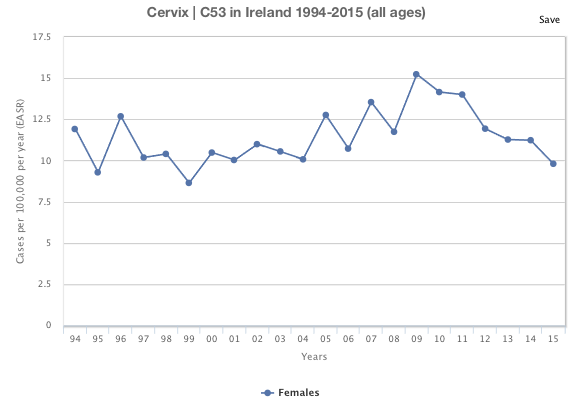Ahead of International human papillomavirus (HPV) Awareness Day, 4th March 2021, Dr Frances Drummond, Research Officer, Breakthrough Cancer Research, speaks to Dr Mairead O’Connor, a Research Fellow in University College Cork about her research as part of CERVIVA – the Irish Cervical Screening Research Consortium. CERVIVA (www.cerviva.ie) is a highly successful health service research consortium, which has been working together for more than a decade in the area of cervical screening and human papillomavirus (HPV) infection. It also focuses on other cancers linked to HPV.
The Facts (source: www.ncri.ie)
- Approximately 300 women are diagnosed with cervical cancer and approximately 100 women die of cervical cancer every year in Ireland (see Figure 1).
- Human papillomavirus (HPV) is a virus which is transmitted from person to person through skin to skin contact
- HPV is the major risk factor for the development of cervical cancer.
- HPV can also cause six other cancers – in women (vulva, vagina, anus, throat, head and neck) and in men (anus, penis, throat, head and neck). An estimated 550 HPV-related cancers are diagnosed in Ireland every year.

HPV Vaccination (https://www.hse.ie/)
- In 2010, the HSE rolled out a vaccination programme for girls in first year of secondary school.
- In 2019, the vaccination programme was made available for first year boys.
- There has been a 14 year follow-up in some countries, and evidence shows that the vaccination remains effective against HPV

Cervical Cancer Screening Programme (https://www2.hse.ie/screening-and-vaccinations/cervical-screening)
- The cervical cancer programme offers free smear tests for women between the age of 25 and 65 years.
- Since March 2020, the smear test looks for HPV – it is now called HPV cervical testing. If HPV is found, then the sample will be checked for abnormal cells.
Eradication of cervical cancer is possible
- Cervical cancer is one cancer which could be eradicated in the coming decades
- The World Health Organisation (WHO) is developing a global strategy towards eliminating cervical cancer as a public health problem.
- The WHO propose that taking a three-pronged approach could bring the incidence of cervical cancer down to 4 cases per 100 000 (the elimination threshold)
-
-
- scale-up of human papillomavirus (HPV) vaccination to 90%,
- twice-lifetime cervical screening to 70%, and
- treatment of pre-invasive lesions and invasive cancer to 90%.
-









 Contact
Contact